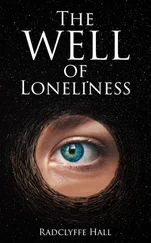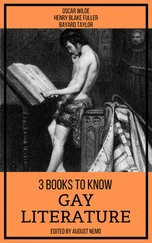'Everyone is mated except myself,' she mused, as she trailed disconsolately across the courtyard. There were the rooks; Canute and Pippin even—transitory as their alliances were, still each this evening seemed to have a partner. 'Whereas, I, who am mistress of it all,' Orlando thought, glancing as she passed at the innumerable emblazoned windows of the hall, 'am single, am mateless, am alone.'
Such thoughts had never entered her head before. Now they bore her down unescapably. Instead of thrusting the gate open, she tapped with a gloved hand for the porter to unfasten it for her. One must lean on someone, she thought, if it is only on a porter; and half wished to stay behind and help him to grill his chop on a bucket of fiery coals, but was too timid to ask it. So she strayed out into the park alone, faltering at first and apprehensive lest there might be poachers or gamekeepers or even errand-boys to marvel that a great lady should walk alone.
At every step she glanced nervously lest some male form should be hiding behind a furze bush or some savage cow be lowering its horns to toss her. But there were only the rooks flaunting in the sky. A steel-blue plume from one of them fell among the heather. She loved wild birds' feathers. She had used to collect them as a boy. She picked it up and stuck it in her hat. The air blew upon her spirit somewhat and revived it. As the rooks went whirling and wheeling above her head and feather after feather fell gleaming through the purplish air, she followed them, her long cloak floating behind her, over the moor, up the hill. She had not walked so far for years. Six feathers had she picked from the grass and drawn between her fingers and pressed to her lips to feel their smooth, glinting plumage, when she saw, gleaming on the hill-side, a silver pool, mysterious as the lake into which Sir Bedivere flung the sword of Arthur. A single feather quivered in the air and fell into the middle of it. Then, some strange ecstasy came over her. Some wild notion she had of following the birds to the rim of the world and flinging herself on the spongy turf and there drinking forgetfulness, while the rooks' hoarse laughter sounded over her. She quickened her pace; she ran; she tripped; the tough heather roots flung her to the ground. Her ankle was broken. She could not rise. But there she lay content. The scent of the bog myrtle and the meadow-sweet was in her nostrils. The rooks' hoarse laughter was in her ears. 'I have found my mate,' she murmured. 'It is the moor. I am nature's bride,' she whispered, giving herself in rapture to the cold embraces of the grass as she lay folded in her cloak in the hollow by the pool. 'Here will I lie. (A feather fell upon her brow.) I have found a greener laurel than the bay. My forehead will be cool always. These are wild birds' feathers—the owl's, the nightjar's. I shall dream wild dreams. My hands shall wear no wedding ring,' she continued, slipping it from her finger. 'The roots shall twine about them. Ah!' she sighed, pressing her head luxuriously on its spongy pillow, 'I have sought happiness through many ages and not found it; fame and missed it; love and not known it; life—and behold, death is better. I have known many men and many women,' she continued; 'none have I understood. It is better that I should lie at peace here with only the sky above me—as the gipsy told me years ago. That was in Turkey.' And she looked straight up into the marvellous golden foam into which the clouds had churned themselves, and saw next moment a track in it, and camels passing in single file through the rocky desert among clouds of red dust; and then, when the camels had passed, there were only mountains, very high and full of clefts and with pinnacles of rock, and she fancied she heard goat bells ringing in their passes, and in their folds were fields of irises and gentian. So the sky changed and her eyes slowly lowered themselves down and down till they came to the rain-darkened earth and saw the great hump of the South Downs, flowing in one wave along the coast; and where the land parted, there was the sea, the sea with ships passing; and she fancied she heard a gun far out at sea, and thought at first, 'That's the Armada,' and then thought 'No, it's Nelson', and then remembered how those wars were over and the ships were busy merchant ships; and the sails on the winding river were those of pleasure boats. She saw, too, cattle sprinkled on the dark fields, sheep and cows, and she saw the lights coming here and there in farm-house windows, and lanterns moving among the cattle as the shepherd went his rounds and the cowman; and then the lights went out and the stars rose and tangled themselves about the sky. Indeed, she was falling asleep with the wet feathers on her face and her ear pressed to the ground when she heard, deep within, some hammer on an anvil, or was it a heart beating? Tick-tock, tick-tock, so it hammered, so it beat, the anvil, or the heart in the middle of the earth; until, as she listened, she thought it changed to the trot of a horse's hoofs; one, two, three, four, she counted; then she heard a stumble; then, as it came nearer and nearer, she could hear the crack of a twig and the suck of the wet bog in its hoofs. The horse was almost on her. She sat upright. Towering dark against the yellow-slashed sky of dawn, with the plovers rising and falling about him, she saw a man on horseback. He started. The horse stopped.
'Madam,' the man cried, leaping to the ground, 'you're hurt!'
'I'm dead, sir!' she replied.
A few minutes later, they became engaged.
The morning after, as they sat at breakfast, he told her his name. It was Marmaduke Bonthrop Shelmerdine, Esquire.
'I knew it!' she said, for there was something romantic and chivalrous, passionate, melancholy, yet determined about him which went with the wild, dark-plumed name—a name which had, in her mind, the steel-blue gleam of rooks' wings, the hoarse laughter of their caws, the snake-like twisting descent of their feathers in a silver pool, and a thousand other things which will be described presently.
'Mine is Orlando,' she said. He had guessed it. For if you see a ship in full sail coming with the sun on it proudly sweeping across the Mediterranean from the South Seas, one says at once, 'Orlando', he explained.
In fact, though their acquaintance had been so short, they had guessed, as always happens between lovers, everything of any importance about each other in two seconds at the utmost, and it now remained only to fill in such unimportant details as what they were called; where they lived; and whether they were beggars or people of substance. He had a castle in the Hebrides, but it was ruined, he told her. Gannets feasted in the banqueting hall. He had been a soldier and a sailor, and had explored the East. He was on his way now to join his brig at Falmouth, but the wind had fallen and it was only when the gale blew from the South-west that he could put out to sea. Orlando looked hastily from the breakfast-room window at the gilt leopard on the weather vane. Mercifully its tail pointed due east and was steady as a rock. 'Oh! Shel, don't leave me!' she cried. 'I'm passionately in love with you,' she said. No sooner had the words left her mouth than an awful suspicion rushed into both their minds simultaneously.
'You're a woman, Shel!' she cried.
'You're a man, Orlando!' he cried.
Never was there such a scene of protestation and demonstration as then took place since the world began. When it was over and they were seated again she asked him, what was this talk of a South-west gale? Where was he bound for?
'For the Horn,' he said briefly, and blushed. (For a man had to blush as a woman had, only at rather different things.) It was only by dint of great pressure on her side and the use of much intuition that she gathered that his life was spent in the most desperate and splendid of adventures—which is to voyage round Cape Horn in the teeth of a gale. Masts had been snapped off; sails torn to ribbons (she had to drag the admission from him). Sometimes the ship had sunk, and he had been left the only survivor on a raft with a biscuit.
Читать дальше












